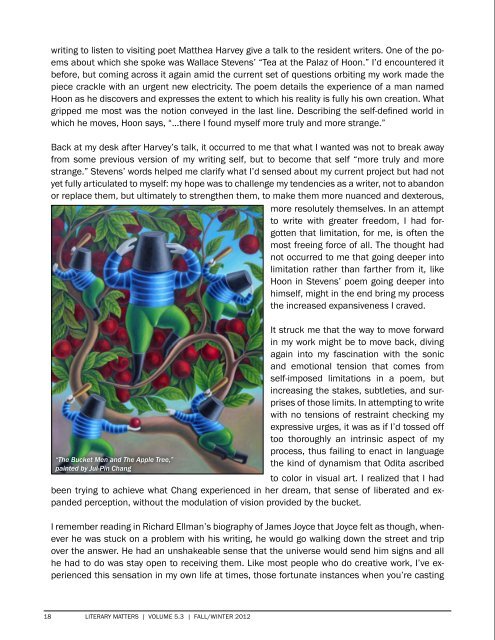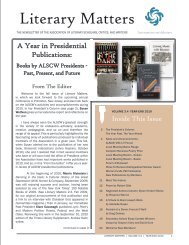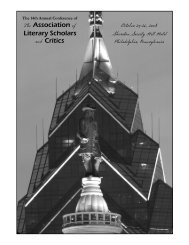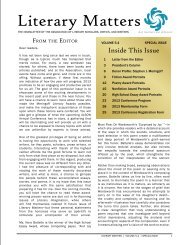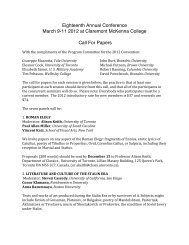Literary Matters 5.3 - Association of Literary Scholars, Critics, and ...
Literary Matters 5.3 - Association of Literary Scholars, Critics, and ...
Literary Matters 5.3 - Association of Literary Scholars, Critics, and ...
You also want an ePaper? Increase the reach of your titles
YUMPU automatically turns print PDFs into web optimized ePapers that Google loves.
writing to listen to visiting poet Matthea Harvey give a talk to the resident writers. One <strong>of</strong> the poemsabout which she spoke was Wallace Stevens’ “Tea at the Palaz <strong>of</strong> Hoon.” I’d encountered itbefore, but coming across it again amid the current set <strong>of</strong> questions orbiting my work made thepiece crackle with an urgent new electricity. The poem details the experience <strong>of</strong> a man namedHoon as he discovers <strong>and</strong> expresses the extent to which his reality is fully his own creation. Whatgripped me most was the notion conveyed in the last line. Describing the self-defined world inwhich he moves, Hoon says, “…there I found myself more truly <strong>and</strong> more strange.”Back at my desk after Harvey’s talk, it occurred to me that what I wanted was not to break awayfrom some previous version <strong>of</strong> my writing self, but to become that self “more truly <strong>and</strong> morestrange.” Stevens’ words helped me clarify what I’d sensed about my current project but had notyet fully articulated to myself: my hope was to challenge my tendencies as a writer, not to ab<strong>and</strong>onor replace them, but ultimately to strengthen them, to make them more nuanced <strong>and</strong> dexterous,more resolutely themselves. In an attemptto write with greater freedom, I had forgottenthat limitation, for me, is <strong>of</strong>ten themost freeing force <strong>of</strong> all. The thought hadnot occurred to me that going deeper intolimitation rather than farther from it, likeHoon in Stevens’ poem going deeper intohimself, might in the end bring my processthe increased expansiveness I craved.“The Bucket Men <strong>and</strong> The Apple Tree,”painted by Jui-Pin ChangIt struck me that the way to move forwardin my work might be to move back, divingagain into my fascination with the sonic<strong>and</strong> emotional tension that comes fromself-imposed limitations in a poem, butincreasing the stakes, subtleties, <strong>and</strong> surprises<strong>of</strong> those limits. In attempting to writewith no tensions <strong>of</strong> restraint checking myexpressive urges, it was as if I’d tossed <strong>of</strong>ftoo thoroughly an intrinsic aspect <strong>of</strong> myprocess, thus failing to enact in languagethe kind <strong>of</strong> dynamism that Odita ascribedto color in visual art. I realized that I hadbeen trying to achieve what Chang experienced in her dream, that sense <strong>of</strong> liberated <strong>and</strong> exp<strong>and</strong>edperception, without the modulation <strong>of</strong> vision provided by the bucket.I remember reading in Richard Ellman’s biography <strong>of</strong> James Joyce that Joyce felt as though, wheneverhe was stuck on a problem with his writing, he would go walking down the street <strong>and</strong> tripover the answer. He had an unshakeable sense that the universe would send him signs <strong>and</strong> allhe had to do was stay open to receiving them. Like most people who do creative work, I’ve experiencedthis sensation in my own life at times, those fortunate instances when you’re casting18 LITERARY MATTERS | VOLUME <strong>5.3</strong> | FaLL/WINTER 2012


